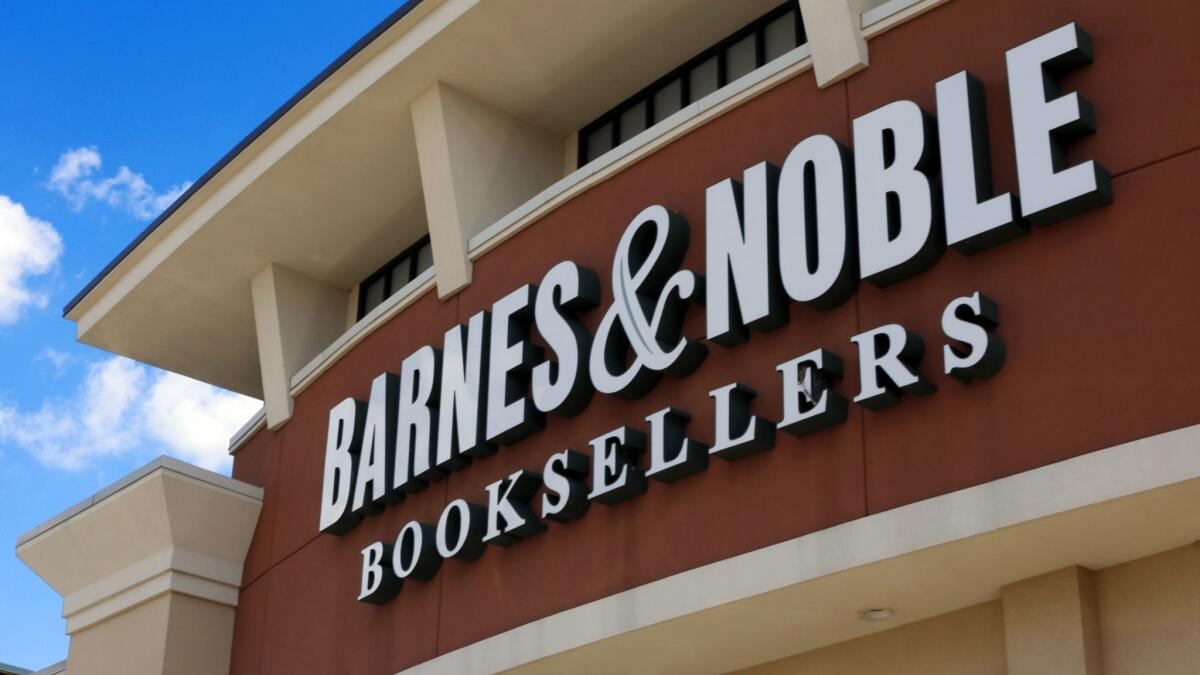Barnes & Noble is sold to a hedge fund

Barnes & Noble Inc. is being acquired by a hedge fund for $476 million and will be taken private.
The national chain that many blamed for the demise of independent bookstores has been ravaged by Amazon.com Inc. and other online sellers, but it remains a key outlet for publishers.
On Friday, it was acquired by Elliott Management and — in a twist — is likely to become a national chain with a business model more like that of a local bookstore.
A year ago, Elliott bought Waterstones, a U.K. book chain that has successfully navigated through the online/e-reader revolution by returning a lot of autonomy to the managers of its nearly 300 stores, who can select books that they believe local readers want.
The man who runs that U.K. chain — James Daunt — will become chief executive of Barnes & Noble, and he said that is what he has in mind.
Leonard Riggio acquired the century-old Barnes & Noble in the 1970s, including its flagship Manhattan store. He pursued aggressive expansion throughout the 1980s and established Barnes & Noble as a national phenomenon with the acquisition of B. Dalton Bookseller and its 797 locations in 1987. It became the nation’s second-largest bookseller and began selling books online in partnership with IBM and Sears.
The company continued to gobble up larger booksellers such as Doubleday Book Shops and also BookStop, which ran discount superstores in Texas.
By 1993, Barnes & Noble was a publicly traded company that was upending the publishing industry.
It tried to ride the digital transformation of books, rolling out its own e-reader, the Nook, in 2009 and offering more than a million books on its website.
But Amazon, which began as an online marketplace for books, was relentless, and its Kindle e-reader is dominant today. Amazon has cut into sales of Barnes & Noble and independent book sellers alike.
Last year, Riggio was brought on stage by Oren Teicher for BookExpo 2018 in New York City.
Teicher heads the American Booksellers Assn., the group representing independent book shops, and a bitter rival of Barnes & Noble.
“Today, we stand together in common cause to promote and support bricks-and-mortar bookstores,” Teicher said. “I’ve been quoted as saying that it’s in the long-term interest of the overall book business that Barnes & Noble not just survive but grow and prosper.”
But Barnes & Noble has suffered.
With about 630 retail stores in the United States as of last year, it is smaller than when it acquired B. Dalton in the late 1980s. Its revenue peaked in 2012 and has fallen every year since.
To reverse that decline, new CEO Daunt will try to replicate what Waterstones has done in Britain.
His main goal is to have each Barnes & Noble store be more tailored to the local market, rather than operate a massive homogeneous chain.
“In chain bookselling, you need to try and get the best store for each location,” Daunt said. “What works in Jacksonville, Fla., isn’t necessarily going to work in Hawaii.”
And he sees advantages for Barnes & Noble in the fight with Amazon, which doesn’t have many physical bookstores where it can offer experiences.
Waterstones organizes multiple simultaneous events at its stores, making them a “fun place to discover books and enjoy the particularities of a bookstore.”
Elliott agreed to pay $6.50 per share of Barnes & Noble, an approximately 9% premium to the stock’s Thursday closing price. Barnes & Noble shares jumped more than 11% on Friday to $6.62.
The sale, valued at about $683 million including debt, is targeted to close in the third quarter if approved by regulators and shareholders.
After that remains a long road to recovery, if that’s even possible. Some industry watchers are skeptical, including Mike Shatzkin, the CEO of Idea Logical Company, a book-industry consulting company.
He called the entire large-store model for any retail chain “a 20th century concept” extinguished by the internet.
“It doesn’t surprise me that Barnes and Noble’s management never came to that conclusion because they built their fortune building bigger stores,” he said. “And I’m not sure Waterstones’ is going to lead them to a different approach.”
However, retailers such as Target and Walmart have done so successfully, in part by using their physical stores as launching points for fast delivery for things bought online.





